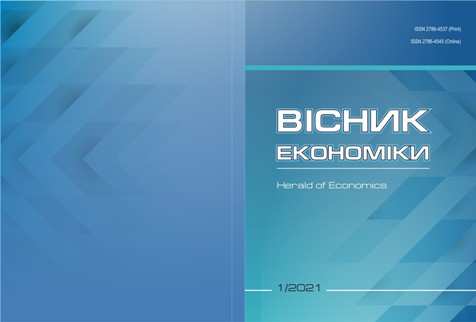Principles of integrated reporting of agricultural enterprises
DOI:
https://doi.org/10.35774/visnyk2024.01.111Keywords:
reporting, integrated reporting, principles, management, enterprise, information, transparency, stakeholders, sustainable developmentAbstract
Introduction. National agricultural enterprises, having found themselves under the influence of the military conflict and European integration transformations, must actively work on entering world markets and attracting investments in order to ensure not only their own sustainability but also the recovery and development of the agricultural sector of Ukraine as a whole. In particular, integrated reporting is becoming a key tool for ensuring transparency and creating a favorable environment for investors. A deep understanding of one's own benefit from integrated reporting enables agricultural enterprises to more effectively adapt to dynamic changes in their internal and external environment. In addition, it creates opportunities to build stable and stable development strategies in conditions of constant challenges and instability.
The purpose of the article is improving and deepening the understanding of the impact of the principles of integrated reporting on the company's communications with stakeholders, who play a key role in the modern business environment.
Methods. In the process of researching the principles of integrated reporting, general scientific methodological techniques were used, in particular induction and deduction. Methods of scientific knowledge, method of analogies, methods of analysis and synthesis, method of system analysis, comparison and generalization were used.
Results. It has been established that the basic and additional principles of integrated reporting are the determining elements in the process of creating a high-quality and integrated integrated report. In addition, the significant impact of these principles on the formation and maintenance of effective information communications between the enterprise and its stakeholders in the context of enterprise management was revealed. It is justified that the basic principles of integrated reporting should be supplemented with the principle of transparency.
Prospects. Implementation with the perspective of compliance with the principles of integrated reporting in accounting practice opens up prospects for enterprises to increase transparency, improve interaction with stakeholders, and increase public trust. This contributes to sustainable development, optimization of resource management, increased competitiveness, and can also lead to the attraction of new investors and expansion of market opportunities for the enterprise.
References
Bezverkhyj, K. V. (2018). Pryncypy integhrovanoji zvitnosti pidpryjemstva. [Principles of integrated enterprise reporting] Retrived from: https://conf.ztu.edu.ua/ wp-content/uploads/2018/01/17.pdf [in Ukrainian].
Lokhanova, N. O. (2012). Do pytannja pro pryncypy pidghotovky integhrovanoji zvitnosti. [To the question about the principles of preparation of the integrated reporting] Ekonomichni nauky. Cer. Oblik i finansy. No. 9 (2). P. 291-299. Retrived
Zhuk, V. M. (2019). Integhrovana zvitnistj: retrospektyva i perspektyva v Ukrajini. [ Integrated Reporting: A Retrospective and Perspective in Ukraine] Oblik i finansy. No. 1(83). P. 20-27. Retrived from: https://doi.org/10.33146/2307-9878-2019-1(83)- 20-27 [in Ukrainian].
Kostjuchenko, V. M., Boghatyr N. V. (2015). Integhrovana zvitnistj jak innovacijna modelj zvitnosti korporatyvnykh pidpryjemstv Ukrajiny. [Integrational data reporting as innovational model of data reporting of corporate enterprices in Ukraine] Ghlobaljni ta nacionaljni problemy ekonomiky. No. 8. P. 1126–1130. Retrived from: http://global-national.in.ua/archive/8-2015/236.pdf [in Ukrainian].
Shynkaruk, V. I. (2002). Filosofsjkyj encyklopedychnyj slovnyk. [Philosophical encyclopedic dictionary] Kyjiv: Instytut filosofiji imeni Ghryghorija Skovorody NAN Ukrajiny,. 742 р. Retrived from: https://shron1.chtyvo.org.ua/Shynkaruk_Volodymyr/ Filosofskyi_ entsyklopedychnyi_slovnyk.pdf [in Ukrainian].
Maljugha, N. M. (2003). Naukovi doslidzhennja v bukhghaltersjkomu obliku [Scientific research in accounting][navch. pos. dlja studentiv vyshhykh navch. zakladiv]. Zhytomyr: PP «Ruta». 476 р. [in Ukrainian].
Shvecj, V. T. (2008) Teorija bukhghaltersjkogho obliku [Theory of accounting]: pidruchnyk. K.: Znannja. 535 р. [in Ukrainian].
Mykhalkiv, A. A. (2010). Pryncypy bukhghaltersjkogho obliku: superechnosti poghljadiv. [Principles of accounting: conflicting views] Visnyk ZhDTU. Ekonomichni nauky. No. 4(54). P. 123–127. [in Ukrainian].
Nesterenko, O. O. (2018). Metodologhija ta orghanizacija formuvannja integhrovanoji zvitnosti [Methodology and organization of integrated reporting]: dys. … doktora ekonomichnykh nauk za specialjnistju 08.00.09 – bukhghaltersjkyj oblik, analiz ta audyt (za vydamy ekonomichnoji dijaljnosti). Kharkiv: Kharkivsjkyj derzhavnyj universytet kharchuvannja ta torghivli Ministerstva osvity i nauky Ukrajiny. 510 р. [in Ukrainian].
Mizhnarodnyj standart z integhrovanoji zvitnosti (2013). Retrived from: https://integratedreporting.ifrs.org/wp-content/uploads/2013/12/13-12-08-THE- INTERNATIONAL-IR-FRAMEWORK-2-1.pdf [in English].
Davydov O. I. (2019). Modelj formuvannja fundamentaljno-stejkkholdersjkoji dodanoji vartosti pidpryjemstv. Naukovyj visnyk Uzhghorodsjkogho universytetu. [Model of formation of fundamental-stakeholder added costs of enterprises] Serija «Ekonomika». No. 1(53). P. 154–162. Retrived from: http://visnyk-ekon.uzhnu.edu. ua/article/view/164645 [in Ukrainian].
Mizhnarodni standarty finansovoji zvitnosti (versija perekladu ukrajinsjkoju movoju – 2014 rik). Retrived from: http://www.minfin.gov.ua/control/uk/publish/ article?showHidden=1&art_id=408095 &cat_id=408093&ctime=1423500775962 [in Ukrainian].
Economic and Social Commission for Asia and the Pacific (ESCAP). Retrived from https://www.unescap.org/sites/default/files/good-governance.pdf [in English].
Oficijnyj sajt ISO standards. Retrived from: https://www.iso.org/iso-26000-social- responsibility.html [in English].
Oficijnyj sajt International Public Sector Accounting Standards Board (IPSASB). Retrived from: https://www.ipsasb.org/ [in English].
International Standards on Auditing. Retrived from https://www.readyratios.com/ reference/audit/international_standards_of_auditing_isa.html [in English].
International Valuation Standards (2021). Retrived from https://www.rics.org/ uk/upholding-professional-standards/sector-standards/valuation/red-book/ international-valuation-standards/ [in English].
Baruch, L. (2018). The deteriorating usefulness of financial report information and how to reverse it. Accounting and Business Research. P. 465–493. Retrived from: https://www.tandfonline.com/doi/full/10.1080/00014788.2018. 1470138?src=recsys [in English].
Affleck-Graves, J., Callahan, C., Chipalkatti, N. (2002). Earnings Predictability, Information Asymmetry, and Market Liquidity. Journal of Business Finance & Accounting. P. 561–583. [in English].
Diamond, D., Verrecchia, R. (1991). Disclosure, Liquidity and the Cost of Capital. The Journal of Finance. Vol. XLVI, No. 4. P. 1325–1340. [in English].
International Framework (2021). Retrived from: https://integratedreporting. org/resource/international-ir-framework/ [in English].



